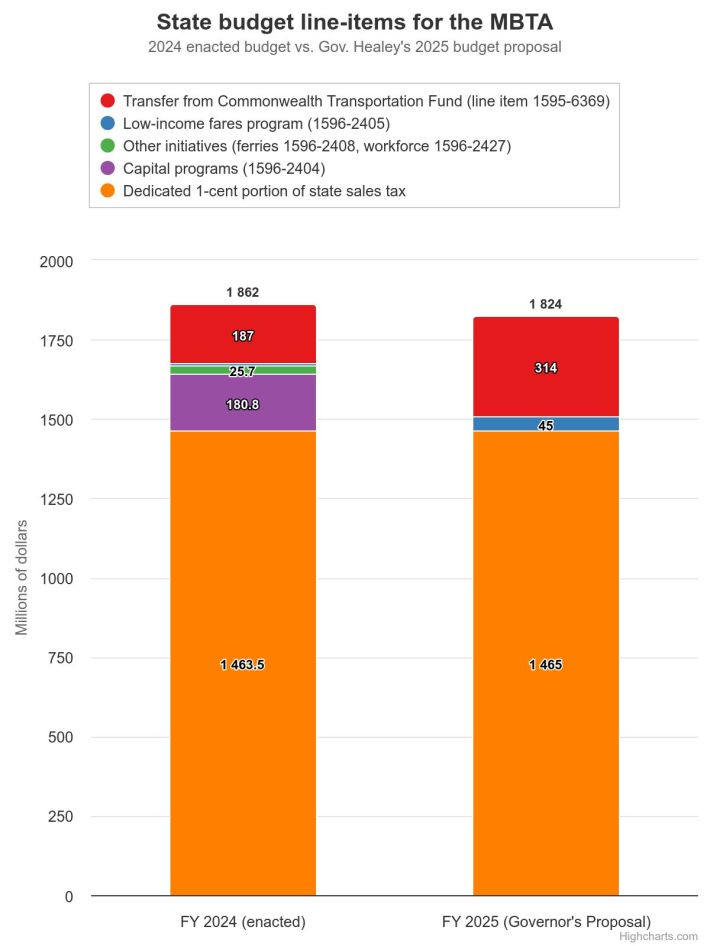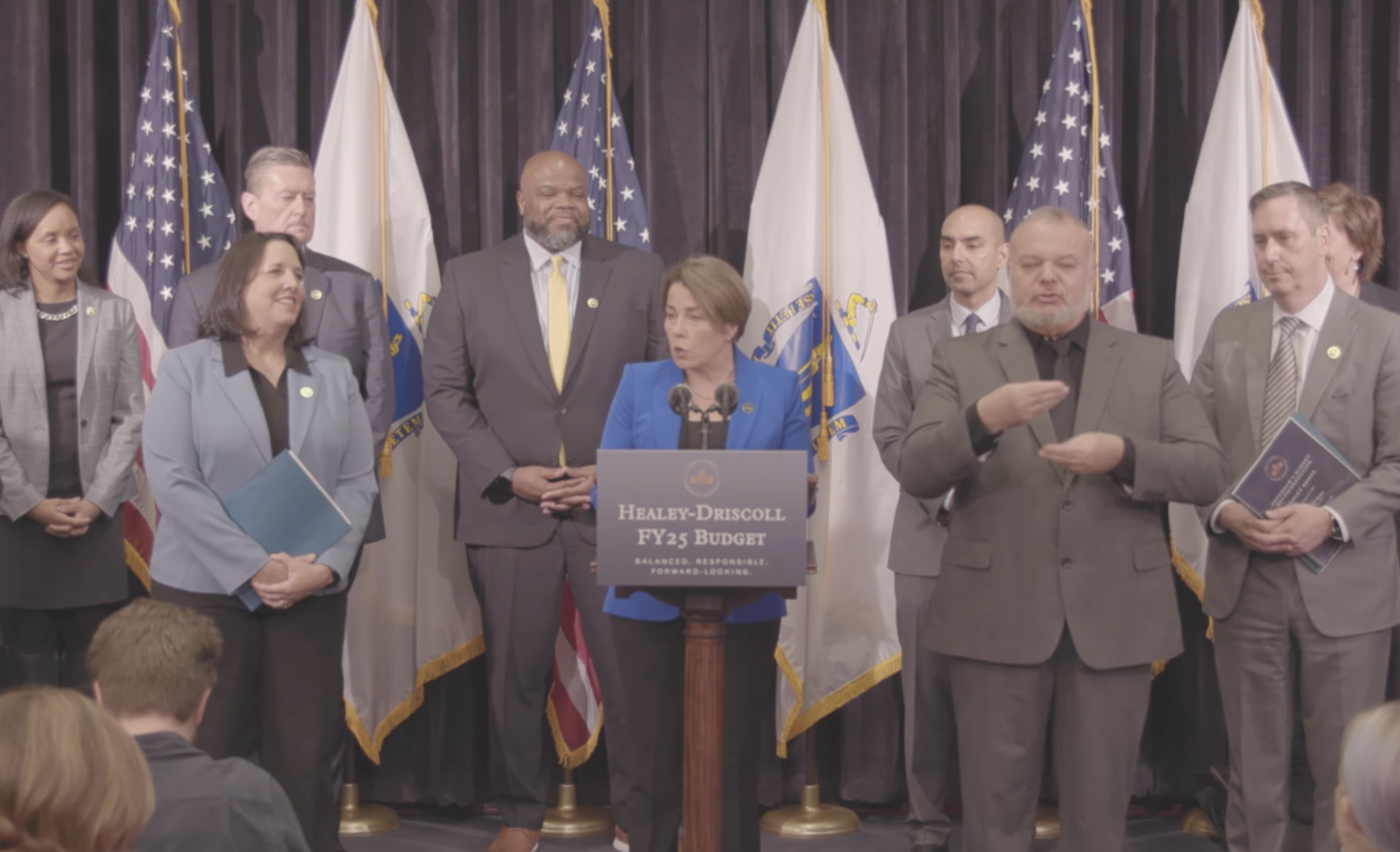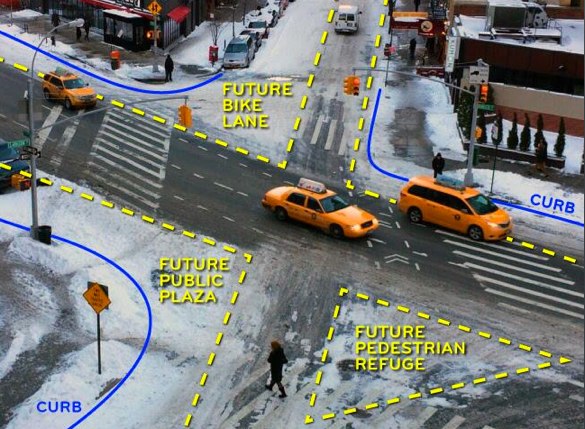During her State of the Commonwealth speech last week, Healey pledged to "double our support for MBTA operations" in next year's budget.
That sounded like a big deal. A huge proportion of the MBTA's funding comes from the state budget. Doubling the state's total appropriations would have been a huge windfall for the state's biggest transit agency.
On Wednesday, Governor Maura Healey unveiled the details of her administration's $56.1 billion state budget proposal.
Those details confirm that the Governor was talking about doubling a very specific — and relatively small — portion of the MBTA's state funding.
In fact, when we add up the total amount of state funding for the MBTA – including statutory sales tax revenues and money for the T's capital budget – Governor Healey's 2025 budget proposal would actually impose a reduction in funding compared to the current year's state budget:

So we likely won't see a major increase in transit spending in Massachusetts this year. But on the bright side, Healey's proposal does lend confidence that the T can balance its budget – at least this year.
Growing MBTA deficits mean increased need for state operating support
For the current fiscal year, the MBTA plans to spend about $2.7 billion for its operations – the cost of running the agency, paying employees and debt bills, and running transit vehicles. This is separate from the T's capital budget, which pays for major construction projects.
To pay for those expenses, the T will receive $1.5 billion from its dedicated share of the state sales tax – which is not subject to annual budget debates – plus $260 million in "contract assistance" that comes from previous years' enacted budget laws.*
That contract assistance includes $218 million from specific line-items in the 2024 budget law:
- A $187 million transfer from the Commonwealth Transportation Fund (which collects money from the state gas tax, car registrations, and sales taxes on motor vehicles)
- A $5.7 million earmark for ferries
- A $5 million earmark for setting up the T's new low-income fare program
- $20 million for expanded hiring and workforce initiatives
All told, these state funds are expected to cover about two-thirds of the T's operating expenses this year. Fares, municipal contributions, and federal funding will cover the remainder.
But next year, the T faces two significant challenges.
With more people on its payroll, higher wages, a new South Coast Rail line to operate, and other initiatives, the T expects to spend considerably more next year.
At the same time, the T is running out of pandemic relief funds, which have helped the T paper over large operating deficits since 2020.
During an MBTA finance committee meeting last week, MBTA Chief Financial Officer Mary Anne O'Hara predicted that the T should prepare for a shortfall of roughly $182 million in the year to come.
The fine print on the Governor's 'double' talk
In Governor Healey's budget proposal released today, the T would get $1.5 billion from the state sales tax – in line with last year's revenues – plus an additional $314 million appropriation for the MBTA from the Commonwealth Transportation Fund, and a $45 million earmark from Fair Share Amendment funds to help the T implement its low-income fare program.
That would add up to $1.86 billion in state funding for fiscal year 2025. That's nowhere near a doubling of the $1.72 billion that the T received from these state budget sources last year.
Last year's budget also included a major $181 million investment in capital projects – the construction work the T needs to do to attain a state of good repair.
Gov. Healey's new budget proposal eliminates that funding.
According to a press release from the Governor's office, the proposed $314 million transfer to the MBTA from the Commonwealth Transportation Fund is "doubling the $127 million in direct operating support in FY24 and maintaining $60 million for pay-go capital."
So here's the Governor's arithmetic:
- The 2024 budget specified $187 million for the T from the state's Commonwealth Transportation Fund; from this, the T transferred $60 million into its capital budget, leaving $127 million for operations (5 percent of its operating budget this year).
- For 2025, Governor Healey proposes a $314 million transfer from the Commonwealth Transportation Fund: a doubling of last year's $127 million for operations, plus another $60 million on top of that for capital programs. 127 × 2 + 60 = 314.
New funds won't expand service, but will balance the budget
The deficit projection that T CFO Mary Ann O'Hara presented to board members last week assumed that the state would provide the same $187 million transfer from the Commonwealth Transportation Fund in 2025, and nothing else.
If Governor Healey's proposal becomes law, her "doubling" of that transfer, plus the $45 million earmarked for low-income fares, would come pretty close to erasing the deficit – at least for this year.
But balancing the budget in future years is going to be more difficult without more reliable sources of funding. O'Hara's longer-range forecasts predict growing budget shortfalls in the range from $500 to $900 million over the next five years.
"We need a plan for a sustainable, equitable transportation funding (and) financing mechanism in Massachusetts," said Governor Healey on Wednesday.
The Governor then elaborated on an idea she mentioned during last week's State of the Commonwealth address.
"After years of, as I've said before, seeing that can kicked down the road, we're taking action to deliver. Earlier today I signed an executive order to create a transportation funding task force. This task force will be composed of both public and private-sector leaders representing communities across Massachusetts. I have asked them to report to me, in less than 12 months, on recommendations on how we can support safe, reliable, efficient railways, roadways, and transit throughout our state."
We'll have more details on that executive order an an upcoming story.
*Footnote: The itemized 2024 budget on the MBTA's website says that the agency received $441.4 million in state contract assistance, but that sum includes $181 million that had been earmarked for MBTA capital (construction) programs – note the $181 million "Transfers Out to Other Funds" near the bottom of the budget document. $260.4 million is therefore the net value of the contract assistance in 2024.






